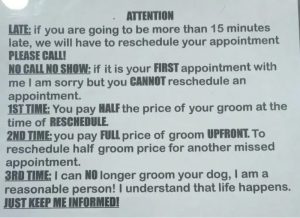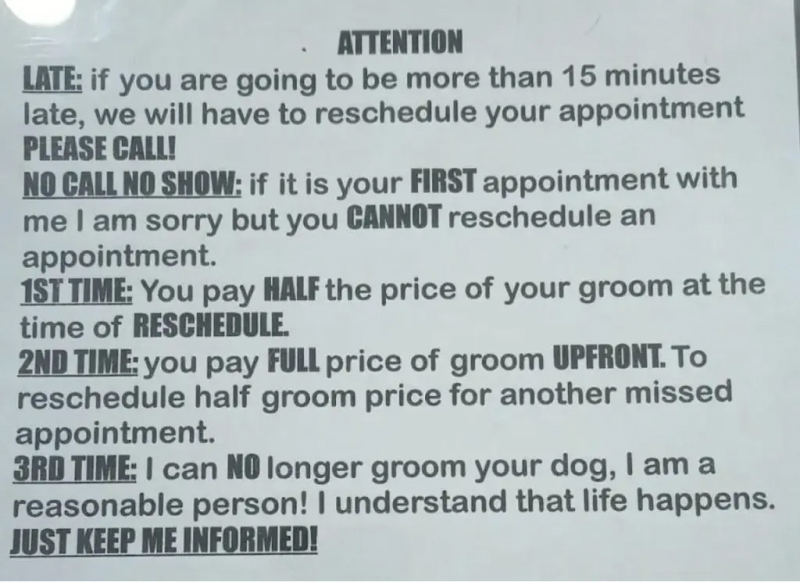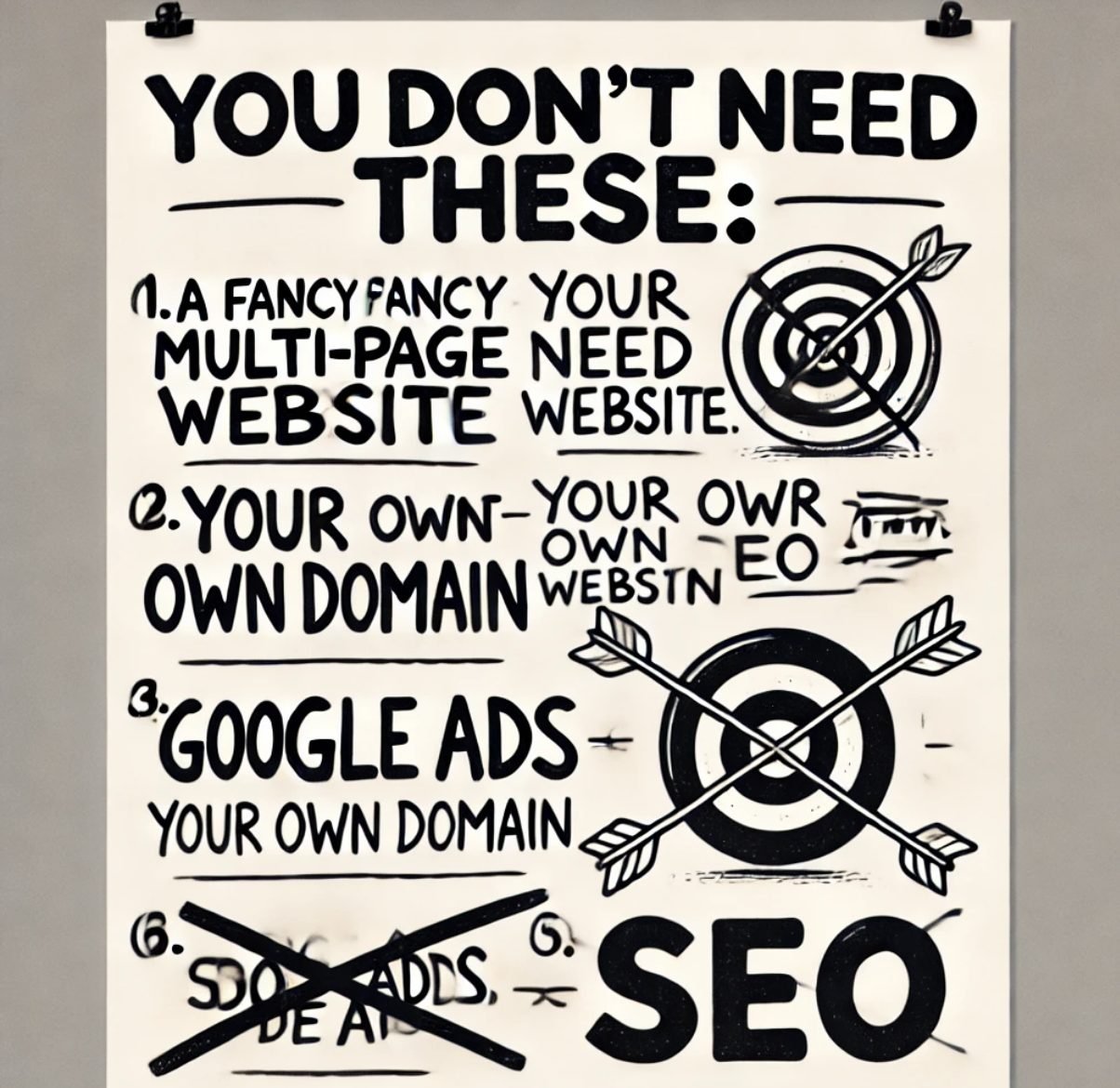Why Your Business Needs a Website, Even in the Age of Social Media
You are a small business owner, maybe just getting started. You might be thinking: “I can create a Facebook page in 20 minutes, and it’s so easy to update the content daily from my mobile phone. Do I need a website?”
It’s a valid question, especially when social media platforms offer free business pages and seem to provide easy access to potential customers. However, relying solely on social media for your online presence can be risky and limiting.
Before we begin, let me clarify: I’m not saying you shouldn’t have a Facebook, Instagram, TikTok, or any other social media profile. In fact, you should – and starting out with one of these pages is a great idea. But, at some point, after proving your business model and satisfying those first few customers, it’s time to take the next step: get a website.
Your website should become the hub of your business, with your social media pages acting as spokes in your marketing funnel. Let’s explore why having a dedicated website is crucial for your business’s success, even in the age of social media dominance.
The Risks of Relying Solely on Social Media
When I say “Facebook” here, I mean any social media platform that you don’t own. This could mean a platform where, one morning, you wake up to find that your business can no longer operate because Meta (or any other company) made a unilateral change or the platform was restricted by government regulation. Imagine: no leads, no way for customers to contact you, and countless hours wasted on building a presence you no longer control.
The Limitations of Social Media Business Pages
While platforms like Facebook offer benefits, they also come with significant drawbacks:
- Lack of Uniqueness: Every Facebook business page looks more or less the same. This makes it tough to stand out in a crowded space.
- Limited Control: You don’t own your Facebook page. The platform can change its algorithms, policies, or features at any time, potentially affecting your visibility and reach.
- Vulnerability to Blocks and Hacks: Your page could be blocked or hacked, leaving you cut off from your customers. Resolving these issues with platform support can take weeks.
- Customer Service Issues: Social media platforms are built for the masses, not for individual businesses. If you encounter problems, support is minimal because you are the product, not the customer.
- Accessibility Limitations: Not everyone uses Facebook. Some people avoid it altogether, while others may not have an account, limiting your reach.
- Workplace Restrictions: Many workplaces block access to social media platforms. This means people might not be able to view your business page during work hours.
- Limited SEO Benefits: Facebook pages don’t rank well in Google searches, which means you may miss out on valuable organic traffic.
Why You Need Your Own Website
Now let’s look at the benefits of having your own business website:
- Complete Control: Your website is your digital property, and you have full control over its content, design, and functionality.
- Information Hub: A website acts as the central location for all your business information, including links, service prices, and social media profiles.
- Professional Image: A well-designed website enhances your credibility and professionalism, serving as the face of your company online.
- Better SEO and Visibility: Your website can rank well in search engines, making it easier for potential customers to find you.
- Email Professionalism: With your own website, you can use a custom email domain (e.g., info@yourbusiness.com), which looks more professional.
- Integration Hub: Your website can serve as the central hub for linking all your social media profiles.
- Advertising Flexibility: You can run Google Ads and other advertising campaigns through your website, potentially reaching a broader audience.
- Ownership of Customer Data: Unlike social media, you own the data you collect on your website – including customer information and payment details.
Addressing Common Objections
Some business owners hesitate to create a website, citing various concerns. Let’s address a few of the most common objections:
Objection 1: “Websites are expensive.”
Reality: Today, creating and maintaining a basic website is more affordable than ever. Hosting providers offer reasonably priced plans, and there are numerous user-friendly website builders. The cost is often less than a few sessions with clients, making it a valuable investment.
Objection 2: “I don’t have time to manage a website.”
Reality: Modern platforms are designed to be user-friendly. With an initial setup, maintaining a basic site requires minimal time and effort. Many website builders offer plugins that automatically display posts from your social media on your site.
Objection 3: “All my customers are on Facebook or Instagram.”
Reality: While many of your customers may use Facebook, not all of them do. Relying solely on social media means missing out on a significant portion of your market.
Objection 4: “I’m not tech-savvy enough to have a website.”
Reality: You don’t need to be a tech expert to have a website. Many platforms offer drag-and-drop builders and templates that make creating a basic site easy. Hiring a professional to help set up the site is a one-time investment.
Recommendations for an Effective Business Website
Here are some recommendations to help you create an effective business website:
-
- Keep It Simple: Your website doesn’t need to be complex. Include essential information about your business, services, and how to contact you.
- Clear Headline: Use a compelling headline that differentiates your business from competitors.
- List Services and Prices: Be transparent about your offerings and prices.
- High-Quality Visuals: Include at least one high-quality photograph that
showcases your business. Modern smartphones can take excellent photos, so
you don’t necessarily need professional equipment.This image, even if alone.


- Or this…

- Simple Color Scheme: Use no more than three complementary colors for your design.
- Avoid Outdated Elements: Stay away from clip art, flashy animations, GIFs,
games, or visitor counters. These can make your site look unprofessional and
dated.
- Mobile Responsiveness: Ensure your website looks and functions well on mobile devices.
- Contact Information: Make it easy for customers to contact you by displaying your information prominently.
- Social Proof: Include testimonials or reviews from satisfied customers to build trust.If you are small pet grooming business wondering whether you need a website, the answer is yes. You will get more clients, look more professional and control your business destiny.
Conclusion
While social media platforms are valuable tools for engaging with customers, they should complement – not replace – your business website. A dedicated website offers control, professionalism, and flexibility that social media alone cannot provide. It’s an investment in your business’s future, helping you establish a stronger online presence, reach a wider audience, and grow your customer base.
So, don’t ask yourself why you need a website if you have Facebook. Instead, ask yourself how much potential business you might be losing without one. The answer might surprise you and motivate you to take that crucial step toward a stronger online presence.


















